Signed Copies of Submerged, and Review of Anon (2018)
Happy belated Thanksgiving, and welcome to the December issue of Hacker Chronicles!
Several of you have asked how to get a signed copy of my upcoming novel Submerged. There are still slots available in the limited run. See under "Writing Update."
This issue features a review of the Netflix movie Anon. And while I'm at it, Merry Christmas and Happy New Year!
Enjoy!
/John
Writing Update
Sign Up for a Signed Copy of Submerged!
For Identified, I offered a limited, numbered, and signed copy called the Binary Release.
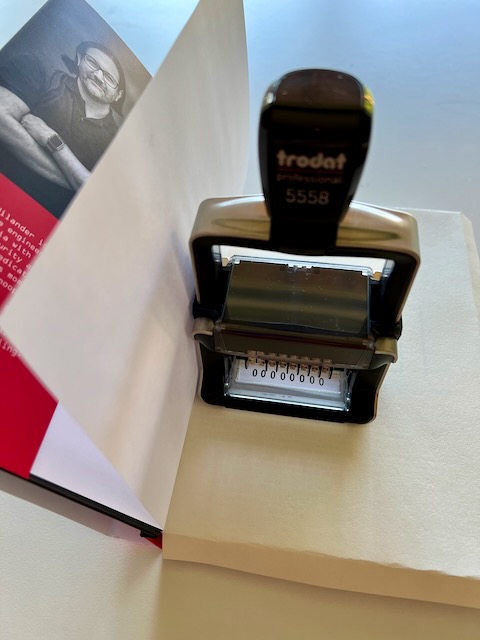
I'll do it again for Submerged, but with fewer copies available. The price will be $50 + shipping, so probably around $60 in the US and a bit more for international.
There are still slots available. You sign up by replying to this email. I don't know yet when I'll get them printed, signed, and shipped.
As always, I appreciate your support for my writing!
Editing Submerged
On December 1st, I uploaded the manuscript of Submerged to the Dropbox folder I share with my copyeditor. Imagine that. Three years of work. I had planned to celebrate with champagne, but it being a Sunday resulted in going for a celebratory 5 km run instead. That's so me. I'm bad at pausing to feel good about things.
The Week of Thanksgiving was the last stretch, and it became incredibly intense. I read the 400+ page final draft in four and a half days while taking notes. Then I addressed those notes in four days. Finally, I went through all my notes on my phone to make sure I had fixed all the things I had thought of and written down during the three years of developing the novel.
I captured the moments in the hard copy of the final draft:
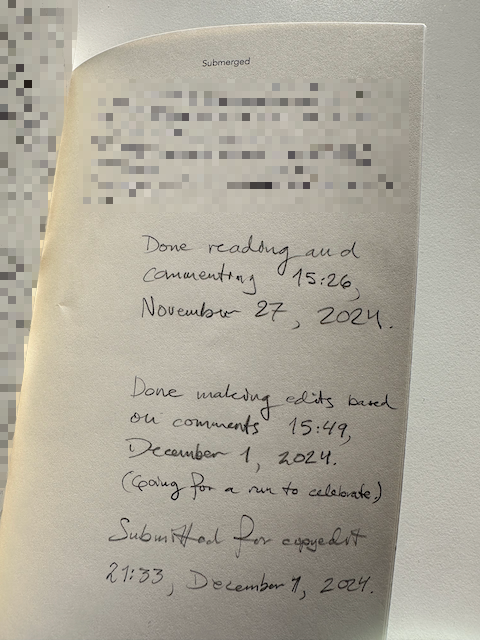
I still have some work to do on maps for Submerged and I haven't made my mind up on the order of the first two chapters yet.
The final word count in Scrivener became 94,846. When exported to Microsoft Word, which is required for copyediting, the word count became 95,579, probably because of chapter titles plus front and back matter.

Let's Connect On Bluesky
The Twitter replacement Bluesky has taken off lately. I've had my wilander@bsky.social account there since mid-2023 but have started using it more now that there's more activity.
I took the time to curate a Cyberpunk and Hacker Thriller Authors starterpack for Bluesky. Use it to follow a set of authors in those genres!
December Feature: Hacker Review of Anon (2018)
Spoiler Alert: Yeah, there are spoilers below.
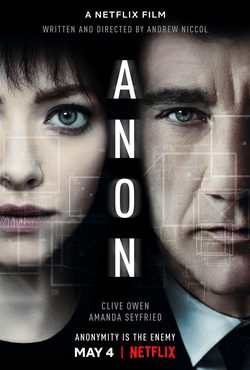
Hacker Rating
Hacker Realism: ⭐️ ⭐️
Hacker Importance for the Plot: ⭐️ ⭐️ ⭐️ ⭐️ ⭐️
Hacks: ⭐️ ⭐️ ⭐️
You can watch it on Netflix.
Trailer: YouTube
The Writer and Director
Andrew Niccol wrote and directed Anon. Combine that with the fact that he also wrote and directed Gattaca and wrote The Truman Show, and you have yourself a legend in movies about surveillance and privacy. What a hero.
The Premise
The movie itself doesn't explain the premise. Wikipedia does however spell it out: "In the near future, humanity lives in a technologically advanced, dystopian society. The government requires that everyone receive an ocular implant that records everything they see. The implant provides an augmented-reality head-up display."
Thoughts:
An augmented-reality head-up display, or AR HUD for short, is popular in sci-fi movies as well as in demos for AR glasses/goggles. The processing of what the person sees together with real-time detection of objects is something I expect will be part of our future. But I'm not sure a constant HUD in our field of view is how we want access to this data. For certain professions, it's already a thing, such as pilots. Audio is another option. We'll see what sticks for broad use.

Opening Scene
We follow a man (Clive Owen) as he exists what looks like a NYC subway station and walks the streets. His HUD (heads-up display) puts boxes around all human heads and faces he meets. The boxes show the people's names, age, and professions. For instance:
Eran Binder
34, Drama Professor
Leandra Ibara
36, Surveyor
The augmented reality also places ads on walls and at store entrances as he walks, including virtual mannequins showing clothes. The man stops as a window displaying wrist watches and gets to see virtually what one would look like on his own wrist.
He continues walking and passes a woman in dark brown hair, a black coat, and black gloves. The HUD box for her reads:
UNKNOWN – ERROR

The man stops and looks after her, intrigued.
He arrives at work which is a tall, all-concrete building. We get to see the HUD box of himself as he walks towards his workspace.
Sal Frieland
46, Detective 1st Class
Thoughts:
It is unclear if people see each other's meta data as they cross paths in the city or if that's only for detectives like Frieland.
The building looks like the (in)famous 33 Thomas Street, formerly AT&T Long Lines Building, in lower Manhattan. It's a windowless skyscraper designed in the Brutalist style and it's a bit mind-blowing that it's still there. It's rumored to house the National Security Agency (NSA) mass surveillance hub code-named TITANPOINTE.

Regarding the AR ads and logos, no doubt we'll see that in the future. The content will be personalized too. It'll probably first come for tourists who want the HUD to do sightseeing, find restaurants, etc. It remains to be seen if locals and people in smaller places will accept an AR layer with ads and logos. There would have to be immense everyday utility to outweigh the annoyance and creepiness.
The Regular Work of Detective Frieland
We see Detective Frieland do his regular work. There's a father who says his son hasn't returned any calls lately. He's asking for investigative help in finding him.
Father: You know what happened?
Frieland: Detected in the Ether an hour ago. You sure you wanna see?
The father insists he wants to, and gets to see his son commit suicide, jumping from a high-rise. The HUD warns him, and the AR logos disappear as the young man gets ready to jump.
Thoughts:
The logos going away when the system understands what the young man is about to do is a subtle but apt detail. Corporations are known for not wanting their brands connected to dark, horrible, or illegal things. I could see them demanding such automatic scrubbing.
The scene also drives home the intrusiveness of the surveillance. Not even in a psychological crisis leading to suicide is a person allowed to be alone. It would have been one thing if the system tried to help, but the HUD warning is only about "hey, don't stand that close to the edge of a building."
Homicide Case
Frieland is called to a crime scene where a man has been shot at point blank range.
The victim’s name is Cray, shot between the eyes, and his record is classified. Frieland's boss Charlie (Colm Feore) grants him access and we get to see clips from the victim's last hour in life.
Cray comes home to his apartment, pours some wine, and reads a book. Then the record of his field of view has some static and he suddenly sees himself from someone else's perspective. That someone else is pointing a revolver at him and eventually shoots him.
Frieland: Shit. He sees what the killer sees.
Charlie: To hide himself. The killer hacks into Cray's Mind's Eye. Cray's point of view …
Frieland: He's looking at himself.
Charlie: And before Cray can make any sense of it …
Frieland: Who can hack a human being?
Charlie: It gets better.
Frieland: As in worse?
Charlie: Look at the metadata time of death.
Frieland: Timeline ends at 18:10 and 24 seconds. Jesus.
Charlie: Not just the identity-theft to hack the man's eye, the victim's alone when he's killed.
Frieland: Or that's what it looks like.
Charlie: Shooter has no signature. No identifying meta trail.
Frieland: What's the world coming to when our murderers won't tell us who they are? Makes a change from picking up crazies we already know are guilty. We actually got ourselves a who-dun-it.
Charlie: Two. Matches another case.
Frieland contemplates humans not detected in the system and mentions the woman labeled UNKNOWN – ERROR he came across this morning. He calls her a ghost, or a blank slate with no digital footprint. Charlie wants to see and Frieland sends him a copy of his record of the woman.
Thoughts:
As Charlie mentions, there are two hacks here. The hacker is able to:
- Hijack the victim's eyesight
- Make themselves disappear or never even be present on the scene
Hijacking someone's eyesight in turn hijacks their visual record, so that what gets stored is what they see from the attacker's perspective. Thus, the attacker is never seen.
This connects to a few things in both hacking and crime investigations.
Attribution is a notoriously hard problem in hacking because digital footprints can be erased as well as forged. Rogue nation state X trying to make it look like rogue nation state Y did it is a thing.
Planted or forged evidence is probably as old as crime investigations. But it becomes extra hard in the digital domain since ones and zeroes can be perfectly supplanted. That plays a key part in my novel Identified.
Certain evidence is considered very strong, such as a DNA profile. That means being able to plant it is a powerful way of pointing accusation in the wrong direction. That is also part of Identified.
I actually think getting your eyesight hijacked would cause instant nausea and motion sickness. Just imagine your vision telling you are moving when you're not or that your head movement is not reflected in your visuals. VR goggles try to make your visuals make sense, but even so, some people complain about motion sickness after some period of usage.
Cray Investigation
The police department investigates Cray's murder.

The footage from Cray's eyes has been stretched to obscure the timeline. The record shows him spending too long on pages in the book and stock information in his AR view has been slowed down. Subtle things the hacker did.
There's also the faint sound of a doorbell when Cray pours wine. He had a ghost guest.
Frieland says the ghost woman he saw matches the description of the attacker from the first case. But he can no longer review that record because it's been deleted from his files last night. He thinks someone got into his record and erased her. He asks Charlie for a copy since he shared with him earlier. Charlie's one is gone too.
Frieland finds that the other people who saw the ghost woman also have had their records scrubbed. He speculates she has an algorithm that finds any instance of herself in people's records and blanks it out.
Thoughts:
Looping surveillance video to fool the people watching is a trope in movies. But time stretching is a fresh take.
Getting a correct timeline from separate pieces of footage is a real challenge when cameras' clocks are not in sync. I'm not able to find the reference now, but I recall the Swedish police had to spend a huge amount of time adjusting for significant time skew in the surveillance cameras that captured the man who murdered foreign minister Anna Lindh.
Third and Fourth Murder Victims
We see a scantily dressed lesbian couple in bed. What looks to be the same shooter as from the Cray case shows up and takes over both women's eyesight, then kills them.
Frieland arrives on the scene. The first responder, a police officer, is there and they discuss what he has observed. As they talk, Frieland realizes the killer is still in the building.
Frieland and the police officer pursue and the policeman is shot. Frieland follows down the stairs, into the night, down into the close-by subway station.
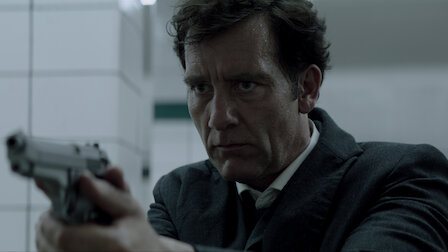
He's shot at in the tunnel. When he gets to the stairs down to the tracks, his vision glitches and he tumbles down. Undeterred, he searches the platform and a train with his gun drawn. Weirdly, the people on the train barely react despite being aimed at. Suddenly, Frieland is hit by a train. He was seeing the wrong thing – there was no train waiting by the tracks.
Thoughts:
The hacker is either able to hack Frieland's vision on the fly, while fleeing, or has already hacked it. If it's the latter, the hacker is aware of Frieland.
Further Investigation
It turns out one of the lesbians was the daughter of a conservative Christian politician and the couple had erased each other from their records for appearances' sake. They had been dating for a year, so it couldn't have been easy to scrub it all.
Frieland and the team are getting a picture of the hacker. They think it's the ghost girl, and that she helps people erase records of unwanted things. She takes payment in cash and may have had sex with her customers before killing them.
They decide to use Frieland as bait.
The Setup
Frieland is set up as a stockbroker with an exquisite downtown apartment. They create a month's worth of records to establish his persona. His coworker Lester (Joe Pingue) will use the next-door apartment to monitor things.
Frieland has sex with a call girl and puts out a call on the Dark Ether to get it erased. Eventually, the ghost girl messages him.
They meet in a public space, then go to his apartment. She calls her profession "fixer" and we never learn her name (actor Amanda Seyfried).
Lester tries to pin "her frequency," sitting in the next-door apartment.
The fixer says she'll only look at what Frieland wants her to see, or wants her to erase. Frieland explains that he wants the call girl gone.
The fixer replaces the evening with pieces of other, boring evenings alone at home. She can't replace it with being at a bar that night because there would be too many other people whose records wouldn't match. And she can't replace with him going to bed early since Frieland allegedly called his girlfriend later that evening.
Frieland starts asking the fixer curious questions. Would she help someone get away with murder? She says it depends on who was killed.
The fixer says she obviously needs to erase herself from Frieland's records once her job is done. Frieland says she can't erase his memories of her. She pulls a revolver, tells him to turn around, and then leaves.

He hears the door slam shut. Or was it a gunshot? He runs after but cannot catch her.
Lester comes out.
I got her fifth proxy. I don't have her record. Yet.
Thoughts:
The proxies seem to be hops in a network trail, possibly like the ones in onion routing which I brought up in the October issue Mr Robot Season 1 Episode 1.
Nit: Finding the boring pieces to patch over the call girl means the fixer does look at past, unrelated episodes in Frieland's record.
Investigating the Fixer
Reinforcements have been added to the investigation. Tech specialists, with the key guy Cyrus Frear (Mark O'Brien) being recommended directly by the Commissioner.
They make use of the proxy Lester got and can now hijack the fixer's eyesight.
Lester: We can only see through her eyes. What she's doing right now. We can't go back in her record until we trace her chain of proxies.
Charlie: Concentrate. Find a clue. Just because she doesn't use the recog doesn't stop us.
Lester: Only way to locate her record is when she's active in the Ether.
Frear: Find her last proxy, we find her.
The fixer gets ready for bed. Someone comments that she's careful where she looks. The task force continues to see through her eyes as she wakes up and has breakfast. They finally see her look out one of her windows, which should give them a location, and then the feed is broken.
Frieland: Were did she go?
Frear: We lost her.
Frieland: The chain of proxies?
Frear: She broke the links.
Lester: Start a new chain. Common practice.
Frieland: Did she see us?
Frear: No.
Thoughts:
"Find her last proxy, we find her" reveals what they are trying to do. The video stream from the fixer jumps through multiple hops, or proxies. Lester was able to find her fifth one whigh she is still hidden by four layers. They can tap into the feed via her fifth one and see what she sees, but they need to get to the last proxy to see her authentic connection to the Ether and pinpoint her.
Nothing is really said about what the fixer sees through her window. We'll get to that soon.
Frear seems certain she didn't see them, which is also unclear why.
The Commissioner's View
There's another murder following the same pattern.

The Commissioner comes to the task force to instill the gravity of the situation. He says they don't understand what they're dealing with.
Frieland says it's a homicide case with now five victims. The Commissioner disagrees and says it's about the integrity of the system.
Commissioner: Those lowlifes got what was coming for them.
Frieland: Victims.
Commissioner: We're getting reports daily. Ghosts, ciphers, call them what you will. The integrity of the system …
Frieland: Integrity?
Commissioner: … is compromised.
The commissioner leans in, eyes fixed on Frieland.
Commissioner: We rely on transparency. We can't control what we can't see. We require persistent identity. This isn't an isolated case. We believe there's a ring of individuals, who may or may not know each other. They, like her, anonymize themselves and others. I don't care the victims no longer exist. I care that she doesn't.
Thoughts:
We get a glimpse of Frieland not liking the surveillance, and what he thinks of as "integrity."
The script writer's view on privacy is very overt in this scene. "We can't control what we can't see. We require persistent identity." is an almost comical line, until you think of how digital identities are being enforced more and more, and how some nation states impose very heavy surveillance on their population. Such a line is not a joke in those places. My novel Identified is about the dangers of such a system going global.
Frieland Needs to Go Undercover Again
The Commissioner leaves, having made his blatant point. Charlie and Frieland look at each other.
Charlie: We need the first proxy in the new chain. You're going back undercover.
Frieland: Sitting in a police precinct with the commissioner of police, I think that's the definition of blowing my cover.
Charlie: It's only been three days. We put a patch over it. Make it look like you've been in the brokerage house the whole time. If, like you say, she doesn't look back, she might go for it.
Frieland: Loyal customer.
Charlie: Maybe she does have a thing for you.
Frieland: Yeah, she's also got a thing for blowing people's brains out.
Charlie: There's a fuck of a lot of commercial interest here. Way above our pay grade. Anonymity is the enemy. We've got to find out how she does it and … de-anonymize her.
Frieland turns to Frear and Lester.
Frieland: Gentlemen, when you make the patch, try to make it half as good as hers.
They decide that the setup this time should be about erasing a drug deal.
Thoughts:
The commercial aspect and the safety promise of the surveillance state is similar to how Precrime is portrayed in Minority Report (see my review here).
Frieland's last comment, "Gentlemen, when you make the patch, try to make it half as good as hers," indicates to me that what they just monitored through the fixer's eyes may have been a patch too. Or Frieland is just referring to the patchwork she did for him, erasing the call girl.
What It Takes to Become Anonymous
Frieland buys cocaine from a dealer in a street corner. The dealer shows up as UNKNOWN – ERROR in Frieland's HUD.
The fixer agrees to erase it and comes to his apartment. She points out that she doesn't have to erase anything on the dealer's side since he never looked at Frieland, intentionally doing his business "blind."
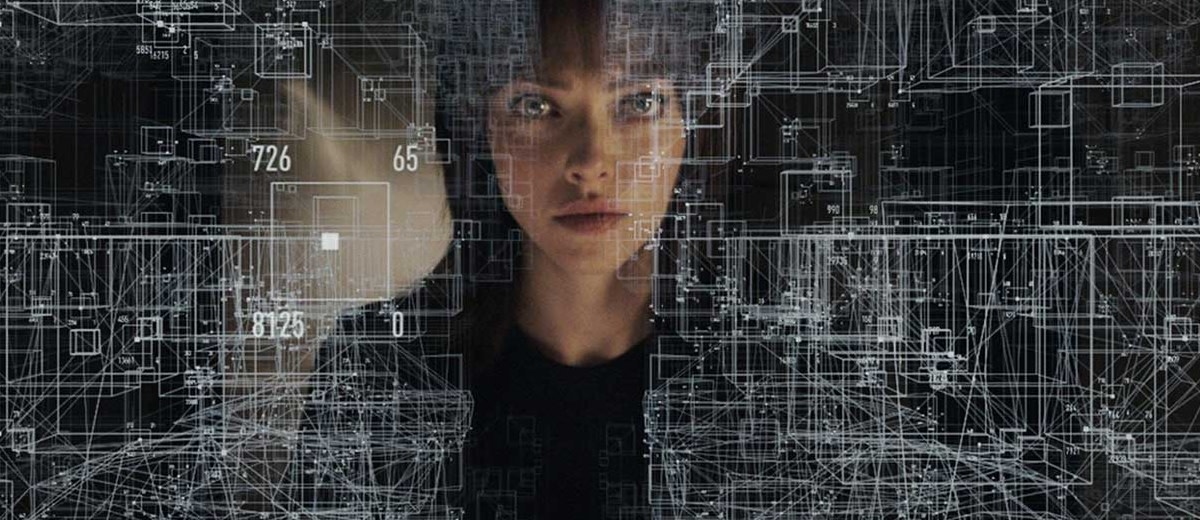
Frieland asks the fixer how long she's been anonymous. They take cocaine together. She says she's been anonymous for 18 years and that it took a lot to erase her past. The analog traces were the hardest. We see a flashback of her burning her personal documents.
Fixer: DFE. Delete Fucking Everything.
She talks about how she was always uncomfortable in the "big room." The outside world, non-cyberspace.
Frieland bows down over the table to snort a third line. He hears the fixer say "You know that's illegal." He turns to her and she's pointing her revolver at his face.
Fixer: You sure you have a girlfriend? You sure act like a single guy.
Frieland slowly reaches out to push her gun away. She lets him do it, takes a step forward, and kisses him.

Fixer: Is there something else you'd like to do? That I can erase?
They make love.
A cut to the fixer in the bathroom. She looks backwards in Frieland's records and finds out he's a detective. Draws her gun.
Frieland hears a shot. He retrieves his own gun and exits the apartment, only to find the door to the neighboring apartment open and Lester inside shot dead.
Thoughts:
Deleting all records of yourself and becoming anonymous is one of those things that's not possible everywhere.
USA doesn't have a central population register or mandatory national identity card. US police forces and driver licenses are per-state. To a large extent, Americans have their own documents proving who they are, such as birth and marriage certificates.
So in the US, the notion of Delete Fucking Everything is within the realm of possibility for an individual, at least culturally.
But in many other countries, that's not the case. You are centrally registered with a government-controlled identity and you can't erase it. My country of origin, Sweden, was the second in the world to enforce a nationwide population register, in 1631. France was first in 1539!
The formal term is Civil registration.
Interesting is that five out of eight countries with no national identity card at all are old British Commonwealth countries: Australia, Bahamas, Canada, New Zealand, and United Kingdom itself. The remaining three are Micronesian island state Nauru, Polynesian island state Tuvalu, and European micro state Andorra.
The writer and director of Anon is from New Zealand.
The Fixer Escapes and Frieland is Blamed
The Fixer escapes and calls Frieland to tell him to not look for her or he'll die.
Charlie and others from the force come to the crime scene. Charlie accuses Frieland of letting the fixer escape and kill Lester. Frieland denies wrongdoing but is told to go home and "take some time."
Frieland goes to his actual home and pours himself a drink. He gets a DM from the fixer.
Fixer: Have a drink. Always helps.
He puts the glass down and scans the living room.
Fixer: Yes, now I can see through your eyes. I like your real apartment. It's more you.
Frieland: How do I know who I'm talking to?
Fixer: You don't. That's the fun.
Frieland: I'm going to stop you.
Fixer: You haven't seen anything yet.
She hijacks his eyesight and puts him in a back alley where a man hunts him down and starts beating him.
The scene changes to one with an aggressive dog biting him.
Next thing, he's back in his apartment, which is now full of rats.
Frieland leaves his apartment only to find a fire in the corridor. He shoots in both directions. His neighbor Thomas DeVry comes out because of the sounds and is scared to see Frieland with a gun in his hand.
Thoughts:
Not knowing who he's talking to is only mentioned in passing, but it could be his superiors pulling something on him. This creates tension in the movie if you pick up on that comment.
It's important to realize here that when Frieland's hijacked eyesight is not complete madness, like the rats, then it's impossible for him to know if what he sees is real or not. Humans can't know when what we see is fake or real. This means from this point in the movie, Frieland cannot trust anything he sees.
The movie doesn't really deliver on the implications of that compromise. Frieland can largely rely on his vision from thereon. The only plausible explanation is that the fixer doesn't want to do Frieland more harm, or doesn't have time for it.
Taking Frieland's hijacked vision to the max would have brought us into unreliable narrator territory which people tend to dislike. Christopher Nolan successfully goes there in movies like Memento, but there the main drivers are the confusion and lies, and the audience leaves not knowing what to believe. Side note: I’ve got to re-watch Memento!
Frieland is Framed
There's a warrant for Frieland, for the shooting of Thomas DeVry, his neighbor.
Somewhere in the confusion around the fire in the corridor, or thereafter, DeVry was shot. Frieland argues that his gun would not have created the kind of wound found in DeVry's chest.
Regardless, Frieland is suspended pending an investigation, and put in house arrest. He is to be monitored around the clock, both through his eyesight and by a police officer down by the street below his apartment.
Frieland goes to bed and pretends to go to sleep.
Keeping his eyes shut, he gets up, and leaves the apartment and building. He only opens his eyes when he's close to the police car outside his building and knocks the cop out.
Thoughts:
Frieland moving with his eyes closed is a great plot twist. I didn't see it coming, but realized what was about to happen right before the moment. That's the kind of audience-feels-awed-and-clever reaction you want.
However, it's unclear why the cops looking through his eyes don't react once he opens them. Maybe it was only the officer in the car doing that.
Frieland Finds the Fixer's Loft
Frieland goes to a high-rise labeled "Metropolitan Life Company Tower." On the other side, i.e. the view from the top floor of Metropolitan Life Company Tower, are windows matching his memory of what the fixer saw through her eyes.
He takes the stairs to the top floor and enters the exquisite loft apartment with his gun drawn. She's there and talks to him from a hiding place.

Fixer: Stay where you are! Put the gun down. Won't do you any good. I can see what you see.
He lowers his gun.
Frieland: Why? Why are you doing this to me?
Fixer: I can't take the credit. Someone is killing my customers, trying to make it look like it's me. I can't tell. I want to show you something. My record. Time of the murders.
Frieland requests to see her record at the shooting of his coworker, Lester. We see her leaving his stockbroker apartment after Lester is already dead.
Frieland: Are you saying the hacker got hacked?
Fixer: They could be watching through our eyes right now. Yours, mine. I'm not safe anywhere. Neither are you. You're the last one I was with who's alive.
Frieland: How do I know you're not lying? How do I know that what you just showed me is your actual record?
Fixer: You don't.
There are sirens. A door to the loft closes. Frieland goes down to the lobby and is met by Charlie and Frear.
Charlie: What part of suspended do you not understand?
They rescind all Frieland's privileges and he's back under house arrest.
Thoughts:
Remember how nothing was said on what the fixer saw through her window? That should have been investigated there and then. If Frieland remembered what the fixer saw and is able to figure out where that is in the city, why didn’t he go there earlier? He's been investigating her for quite some time. This is a plot hole, unfortunately.
There's clearly a plot twist here. The fixer claims she did not kill her clients and that she's being framed. It's not stated, but my assumption is that she doesn't know that Frieland has been framed too.
Showdown
Frieland, back home, and under double surveillance, does a whole lot of nothing. Eventually he gets a DM from the fixer.
Fixer: I want you … tonight.
Frieland: They're watching.
Fixer: That's what they think.
Frieland: They're outside my building.
Fixer: Not for long.
She hacks the eyesight of the officers in the two cars outside Frieland's building and sends them on a manhunt for an armed and dangerous person at large.
She walks towards his building.
Frieland sees her through the window and cocks his gun, only to hear another gun be cocked in his apartment. His vision changes to that of someone carrying a revolver, closing in on him in his own home.
Frieland flips around and shoots at that someone, not based on what he sees but based on his knowledge of the apartment's layout. The intruder shoots him at the same time and Frieland falls to the floor.
We see the fixer enter and point her gun at the intruder as they face each other. The intruder turns out to be Frear. Frieland's bullet hit him, but he is still standing. He grabs the fixer's shoulder and starts talking.
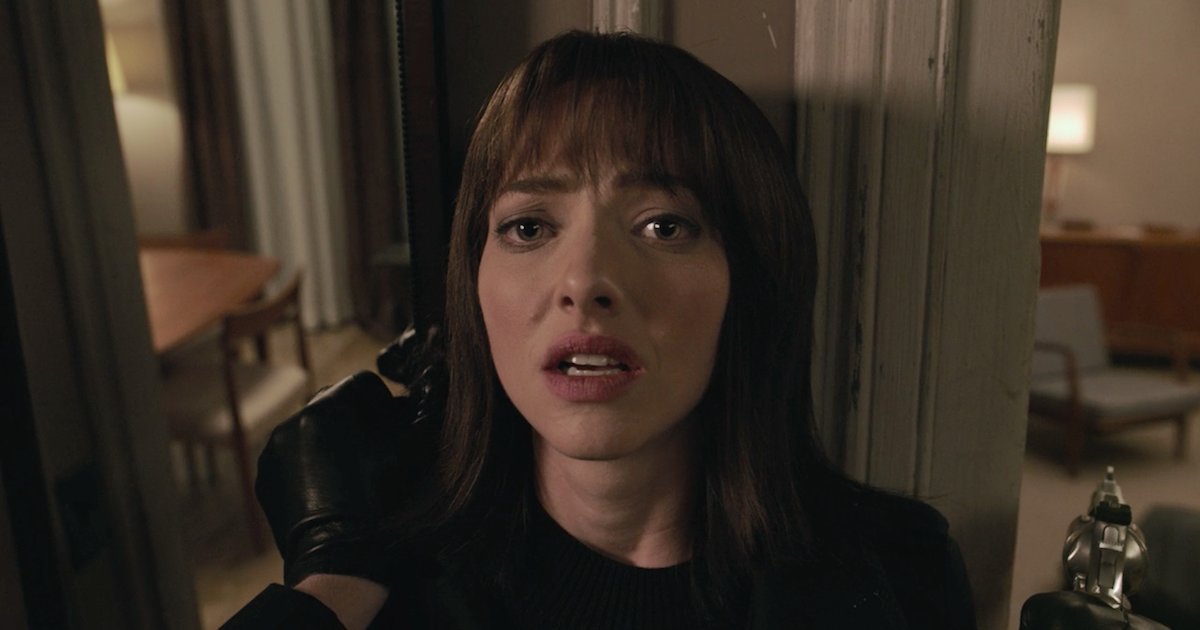
Frear: I fell for it. Looking through his eyes, I forgot to look through yours. Well, now you can both look through mine. Why'd you do this? It was perfect. We were never meant to meet.
Fixer: Who are you?
Frear: I know who you are.
Fixer: You found me in the Ether?
Frear: No. No, you found me.
Fixer: You're the anonymous proxy? The last one in the chain. You kept me safe.
Frear: They hired me to lead them to you. I led them away.
Fixer: You've seen my record. You know how I hide.
Frear: The algorithm is brilliant. Really. I know how bad you wanna disappear. You erase records … but you can't erase memories. I can.
Frear points his gun at Frieland who's on the floor. The fixer pushes Frear's hand down.
Fixer: No. We can hack this out, like it didn't happen. You can disappear. We can.
Frear: No. It's different now.
Fixer: Why did you make it look like it was me?
Frear: We're together.
Frear sees Frieland move in the corner of his eye and points his revolver at him. Frieland sees what Frear sees and realizes he's about to get killed.
Frieland shots Frear behind his back without looking.
Frear is badly hurt and limps out into the corridor with the fixer.
Frieland follows, using the walls to guide him since he's seeing the wrong thing. Frieland shoots and kills Frear in the corridor. The fixer leaves.
Thoughts:
Frieland knowing the layout of his home well enough to shoot without seeing is plausible, but as I mentioned earlier, I think seeing what someone else sees would cause nausea.
Just to spell it out, the reveal from Frear is this:
Frear was hired to track down the fixer, possibly before the start of the movie. He gets to see her have sex with some of her clients and develops possessive jealousy. He uses his hacking powers and his proxy in the Ether to protect the fixer, always ensuring she could evade the police. But he also starts killing the people she's had sex with, out of spite. He never intended to meet with her, only to keep watching and helping her.
Closing Scenes
The Commissioner is furious about Cyrus Frear's records being gone. He's questioning Charlie about it. Charlie points out that Frear was recommended by the Commissioner himself. They both realize Frear made it look like the Commissioner had recommended him to get direct access to the investigation.
Frieland goes back to the public space where he first met the fixer. She shows up and says she's sorry for using him as bait to get to Frear.
Frieland: So he found you, your life. That was the beginning.
Fixer: Anyone I was with. He didn't want me like that. So no one else could have me either.
Frieland: Don't suppose you're gonna tell me how you do it? How you disappear.
Fixer: It's there for anyone to see if you know where to look. You have my record already. I gave it to all of you.
Frieland: The algorithm.
Fixer: Breaks my life up into fractions of seconds and randomly stores them in the records of everyone else. But if you try to find that split second of me, it would go by without you knowing. You have to have the algorithm to put my entire life back together. If you want to look back.
They discuss privacy. Frieland says everyone has something to hide.
Fixer: It's not that I have something to hide, I have nothing I want you to see.
Thoughts:
When Frieland says "So he found you, your life. That was the beginning," the subtitles read "So we found you." That is a bad error since it makes it sound like the police department found her when it was Frear who found her. I just had to report that one to Netflix.
The end conversation on privacy is on the nose, unfortunately. It feels like the writer just had to get it off his chest, as a lesson for us all. Sure, the argument that people who "have nothing to hide" also have nothing to fear is tired, wrong, and debunked. My favorite counterargument is that it's the surveillance apparatus that should prove they have nothing to hide. They are the ones collecting data, not you or me. But it would have been nicer for the movie to have driven that home in a more subtle or natural way. Now it feels like going to a lecture.
Final Remarks
The movie's color grading and use of concrete buildings are dystopian to the point of being ham-fisted. And as mentioned, some of the privacy message is delivered in-your-face. That makes the movie more forced than it has to be.
There is a lost opportunity to have Frieland change in the end. I.e. to fight the surveillance or to want privacy of his own. We get a glimpse of that when he says "Integrity?" to the Commissioner. But Frieland remains a detective and questions why the fixer wants privacy.
The visuals of the Ether are pretty good. Not over the top. The HUD is effective too, especially as a vehicle for show, don't tell.
Being able to erase records and the legitimate "right to be forgotten" is not explored beyond the lesbian couple feeling forced to hide their relationship. The rest of the movie's erasing is about art forgery, illegal drugs, and having sex with a hooker while in a relationship. There's so much more in the average person's life that would be harmful to keep forever in a digital record. I'm a genuine believer in the ability to forgive and forget as a key way of coping and surviving as a human being.
Currently Reading
November spare time was almost all writing so I'm naturally still reading Acts of the Apostles by John F. X. Sundman.